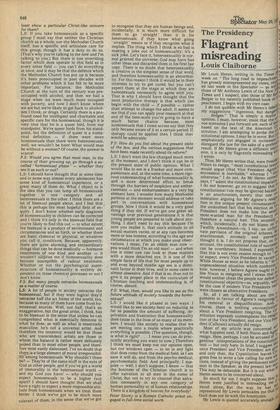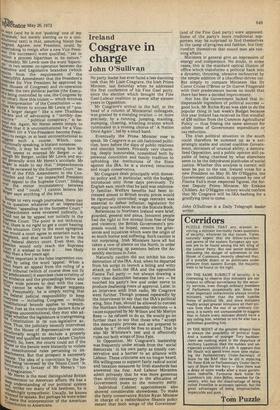The Presidency
Flagrant misreading
Louis Claiborne
Mr Louis Heren, writing in the Times week on "The long road to impeachniel4 has grossly misrepresented my views, re ed last week in the Spectator — as wa., those of Mr Anthony Lewis of the New I Times and I suspect, also those of Mr Berger in his recently published book on peachment. I begin with my own case. og I do not quibble with Mr Heren's my suggestions "ingenious, but chine . . . dodges." That is simply a matter opinion. I must, however, insist that theytel ous scenarios I put forward are, each of tto: based on the text of the American stitution; I am attempting to probe the 1, stitutional options. I may be in error. But emphatically not engaged in incitemeraw disregard the law for the sake of a preterit; result. If Mr Heren gives a different iraP't;: sion, it is only by flagrantly misreading vi" I wrote. Thus, Mr Heren writes that, were Presil -Nixon to resign, "most 'consitutional would argue (that Vice President Agile101. succession is inevitable," whereas .otherwise." I do not. As Mr Heren corrc'e says, I "admit the Constitutional imperat01:0 I do not however, go on to suggest that constitutional rule may be ignored becattgo is an anachronism, merely that one sideration arguing for Mr Agnew's reeg tion in the unique present circumstance.so the undoubted fact that his election as ".h• President does not make him the secirs; most-wanted man for the Presidency 6, therefore a natural heir. This anomalY,t, which, incidentally, I do not blame Twelfth Amendment—is, I say, an unf01"1 nate pervision of the original scheme. fi'd anachronism, anomaly and perveM thought it is, I do not propose that, on tci account, the constitutional rule of successii can be overthrown. Indeed, I expressly,:st that this is not even reason enough to ty or expect, every Vice President to vacate to White House as soon as he inherits it." Irl..10 unprecedented situation which confront'4 now, however, I believe Agnew ought ta:k, low Nixon in resigning and I stress that would neither cheat the people nor defeat "0 constitutional objective—as, arguably, Op, be the case if modern Vice Presidents res.
were chosen as alternative Presidents. ft So, all I am talking about are the .4 guments in favour of Agnew's resigning.d his removal or disqualification. And. course, there is nothing unconstitutiaoro about a Vice President resigning. The stitution expressly contemplates the res1o.4 tion of the Vice President, and one Vice Pr' dent (Calhoun) actually did resign. Most of my article was concern.-.0 what happens next, if both Nixon and Alkip resign. Here, perhaps, I can be accused genious ' interpretations of the constitutiF4, text — but only here. In brief, I suggest once President and Vice President are and only then, the Constitution leaves gress free to write a law calling for new tions, instead of giving the permanent su,0 sion to the Speaker, as the present laW d' or This may be debatable. But it is not what
Heren seems to be concerned about. t
So much for me. I might suppose tha if I Heren were justified in misreading nte.„0 stood alone. But the way he has "'At represented Mr Lewis persuades me that
fault does not lie with the Americans. lI Mr Lewis is quoted accurately enough.
ir, Says (and he is not 'pushing' one of my osals,' but merely alerting us to a conr'Itutional text) is that, assuming Nixon has ,e signed, Agnew, now President, could, by rdertaking to resign after a new Vice Presirneat (his successor) were qualified, "set in 011 a process bipartisan in its nature." s;esurnably, Mr Lewis uses the word tiparti0 ' in two senses: co-operation between the eeutive and Legislative branches (which, rTtilts from the requirement of the hWentyfifth Amendment that the President's 'enlinee for Vice President be approved by '1;1'th Houses of Congress) and co-operation 7tween the two pblitical parties (the Execurlle being controlled by one, the Congress by ,,other). How this truism — which involves titl interpretation' of the Constitution — en
e
ih S Mr Heren to accuse Mr Lewis of " pos1 R",e a larger danger" like a new Thaddeus "t`evens and of advocating a "terribly desyrntletive " . , . "political conspiracy," is betu,"d me. Again, Mr Heren seems simply to pr-eueve that it is unconstitutional for a Viceci6sident (or a Vice-President become Presi t) to resign, or at least unconstitutional to i't.ggest such a course. Which, con1,14, tionally speaking, is blatant nonsense. many, it may be worth noting how Mr thenren seems to misread Mr Berger — alsZPgh Mr Berger, unlike Mr Lewis and my-i generally wins Mr Heren's accolade. Mr nserger is made to say that " impeachments c"tast be reviewed by the Supreme Court "be. :Ilse of the Fifth Amendment to the Con„`Itution and that "an impeached President `-oGu,,ld „ appeal to the Supreme Court.” Sliding .."`r the minor inconsistency between 8tritist.., and "could," I cannot believe Mr erger says anything of the kind. be4cept in very rough journalese, there can
nn question whatever of an Impeached
re re ,sident "appealing to the Surpeme Court." 'Inpeachment were reviewed judically, it scluld not be by appeal nor initially in the pllOrern e Court. The point is not technical. ihirst, there is no right to get a court hearing Q,,,this situation. Only in the most egregious c,--n_a would a court agree to entertain such a 1,;'"Plaint, and that would have to be the 0,41 federal district court. Even then, the Cestion would only reach the Supreme tot),turt if it wished to hear it . . less likely
LaY than a few years ago.
vc,'"„ e're important is the false impression conZed by using the word 'appeal.' When a ih'rt hears an appeal from the ruling of a Wer tribunal (which of course does not fit Predicament) it exercises close scrutiny of erie. evidence and the proceedings below and Th3°Ys Wide powers to deal with the case. n cannot be what Mr Berger suggests the. Presumably, he is simply saying that even federal judicial responsibility to keep eo'rYnne — including Congress — within rrinstitutional bounds applies to impeachents. Just as the courts may declare Acts of ress unconstitutional, they may also adthe'ge Whether the legislature is transgressing tk Constitution in its non-legislative ac S. Thus, Thus, the judiciary recently intervened st'i:en the House of Representatives unconetinnally sought to exclude a properly p'eted and qualified member (Adam Clayton So, here, the courts could act if the th-e"se or the Senate were blatantly to violate ea Constitutional rules pertaining to im e_h,rrients. But that prospect is extremely h,'te. The idea of a conviction by the Sefor being 'reversed' by the 'Nixon Court ' is, ho,unately, a fantasy of Mr Heren's "too LiMagination." Heren is the most distinguished British oe'''rnentator on American affairs. He has a an") understanding of our political system rel.'r unlike too many of his brethren, he is eshingly sympathetic. Usually, he knows to recd. he speaks. But perhaps he were wiser eave the interpretation of the American hibilstitution to Americans.



































 Previous page
Previous page